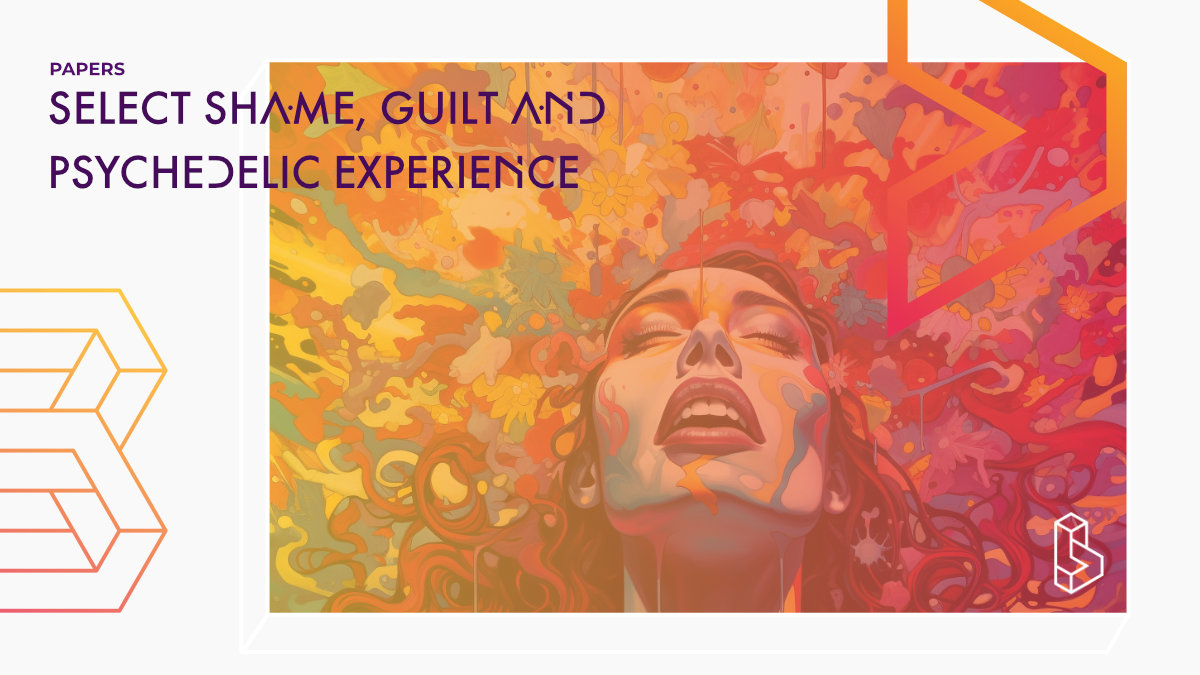This prospective, longitudinal study (n=679) examined the effects of psilocybin use on emotional experiences, particularly feelings of shame and guilt. The study found that while most participants had positive experiences with psilocybin, acute feelings of shame or guilt were common (68%), and the ability to work through these feelings positively correlated with well-being in the weeks following use. On average, psilocybin resulted in a small but significant decrease in trait shame, which was maintained for 2-3 months after use, though in a minority of participants (30%), trait shame increased.
Abstract of Shame, Guilt and Psychedelic Experience
“Introduction: The classic psychedelic psilocybin has attracted special interest across clinical and non-clinical settings as a potential tool for mental health. However, despite increasing attention to challenging psychedelic experiences, few studies have explored the relevance of emotionally painful, shame-related processes with psychedelic use.
Methods: This prospective, longitudinal study involved sequential, automated, web-based surveys that collected data from 679 adults planning to use psilocybin in naturalistic settings at timepoints before and after psilocybin use. State and trait shame and feelings of guilt were collected using validated measures and assessed alongside other measurements of psychological health.
Results: Participants were primarily college-educated, White individuals residing in the United States with a prior history of psilocybin use; mean age = 38.9-41 years. Most users (89.7%) described their experience of psilocybin as positive, though acute feelings of shame or guilt were commonly reported (i.e., 68.2% of users) and difficult to predict. Ratings of participant ability to constructively work through these feelings predicted wellbeing 2-4 weeks after psilocybin use. Psilocybin on average produced a small but significant decrease in trait shame that was maintained 2-3 months after use (Cohen’s dz = 0.37; adjusted p <0.001). Trait shame increased in a notable minority (29.8%) of participants.
Discussion: The experience of self-conscious emotions with psychedelics has been explored minimally, but further study in this area may have far-reaching implications for psychological health. The activation of shame-related experiences with psychedelics may pose a unique and context-dependent learning condition for both therapeutic and detrimental forms of shamerelated memory reconsolidation.”
Authors: David S. Mathai, Daniel E. Roberts, Sandeep M. Nayak, Nathan D. Sepeda, Amy Lehrner, Matthew W. Johnson, Matthew X. Lowe, Heather Jackson & Albert Garcia-Romeu
Summary of Shame, Guilt and Psychedelic Experience
Classic psychedelics induce profound changes in affect, perception, cognition, and other subjective processes that individuals frequently interpret as meaningful experiences. These experiences can range from extremely positive to psychologically challenging experiences marked by various forms of emotional distress.
In the mid-1960s, “good” and “bad” psychedelic experiences became increasingly dichotomized, shaped by the American War on Drugs and the regulatory agenda of prohibition. However, more nuanced possibilities were lost in this division, such as the possibility that difficult affective states might be typical.
Find this paper
https://doi.org/10.1080/02791072.2025.2461997
Open Access | Google Scholar | Backup | 🕊
Cite this paper (APA)
Mathai, D. S., Roberts, D. E., Nayak, S. M., Sepeda, N. D., Lehrner, A., Johnson, M. W., Lowe, M. X., Jackson, H., & Garcia-Romeu, A. (2025). Shame, guilt and psychedelic experience: Results from a prospective, longitudinal survey of real‐world psilocybin use. Journal of Psychoactive Drugs. https://doi.org/10.1080/02791072.2025.2461997
Study details
Compounds studied
Psilocybin
Topics studied
Personality
Study characteristics
Survey
Participants
679
Humans

